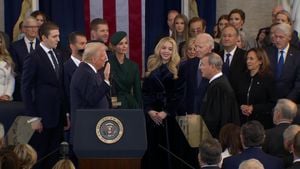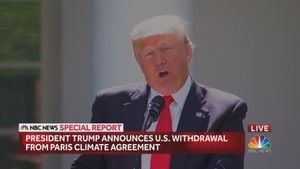French Interior Minister Gérald Darmanin began his official visit to the United Arab Emirates on Monday, with the goal of enhancing judicial cooperation between the two nations, particularly focusing on their mutual fight against drug trafficking.
Throughout this visit, Darmanin is set to address the issue of French criminal networks, with notable attention on individuals seeking refuge within Dubai. His initial meetings will take place in the capital, Abu Dhabi, where discussions with judges and the UAE's Minister of Interior will highlight joint efforts against international drug trafficking.
This visit follows Darmanin's previous trip to the UAE earlier this year when officials initiated collaborative measures to tackle issues of crime and drug trafficking collectively. During this initial visit, which was part of the International Security Alliance, the emphasis was placed on enhancing judicial exchanges and cooperation. Such partnerships have reportedly led to the arrest of several drug traffickers whom France was eager to apprehend, though the actual processing of extraditions has seen limitations.
Among the significant cases highlighted during this cooperation is Abdelkader Bouguettaia, who is also known as "Bibi." Currently awaiting extradition, Bouguettaia was sentenced to nine years in absentia for his role in the illegal trafficking of 599 kilograms of cocaine seized in Belgium. He is also suspected of having facilitated the importation of 2.5 tons of cocaine intended for Le Havre. These developments reflect the challenging and complex nature of the fight against international drug trafficking.
Another notorious figure, Abdel Karim Touil, initially arrested in Dubai, managed to escape to Lebanon after his release. He was later extradited to France last July, illustrating the constant hurdles faced by law enforcement agencies as they attempt to suppress these networks.
Both Paris and Abu Dhabi recognize the international dimensions of drug trafficking, which continues to pose significant threats to their respective societies. The judiciary's collaboration is set against the backdrop of increasing globalization of crime, which requires synchronized efforts to address its roots and ramifications.
Throughout his meetings, Darmanin is expected to reaffirm the commitment of France and the UAE to counteract organized crime and reinforce security measures adhering to international norms. Ample resources and intelligence sharing between the two nations could potentially yield significant outcomes as they join forces to confront these complex criminal networks.
The French minister's visit shines light on broader security concerns, as countries around the globe seek to strengthen ties amid the increasing escalation of various forms of illicit trade. The collaborative framework forged between France and the UAE may serve as a model for future partnerships among nations grappling with similar challenges.
Both governments are poised to conduct regular follow-ups to these discussions, emphasizing the importance of continued dialogue and the implementation of effective strategies to combat the rising tide of drug trafficking across borders.
Through Darmanin's discussions and the evident commitment to judicial cooperation, the fight against drug trafficking signifies not only enforcement against crime but also reinforces the call for comprehensive international frameworks capable of adapting to the dynamic landscapes of organized crime.
Clearly, the work between France and the UAE will be pivotal as they confront the obstacles posed by global drug trafficking together, aiming to develop sustainable solutions to this pressing issue.



